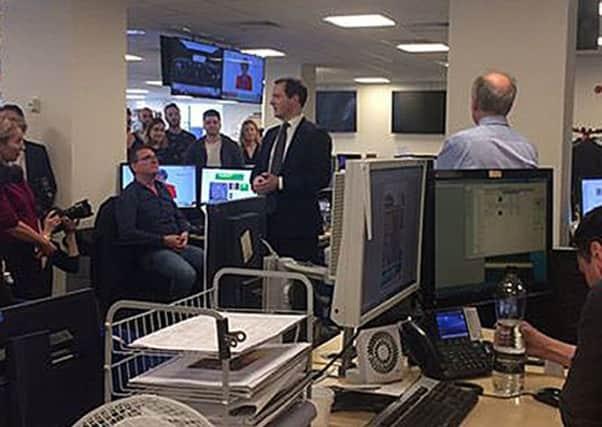Euan McColm: Osborne raises the Standard for opposition


In the foreign country of 2010, Labour dominated the general election in Scotland. The party’s key message, as it had been for decades, was that Conservatives were evil. So, when Osborne arrived in Scotland, Labour candidates launched predictably ferocious attacks on this Tory toff who’d swaggered north to patronise the natives.
The crude caricature of Osborne as a rabid right-winger ignored the reality that his politics were of the same centre ground that Labour had dominated since 1997 when Tony Blair won the first of three elections. Far from being an archetypal unreconstructed right-winger, Osborne believed the Tory Party had to change. He and his friend David Cameron were not, no matter how hard Labour spun, modern day Norman Tebbits. They were the heirs to Blair, talking a pragmatic politics to voters in England who had grown disenchanted with Gordon Brown’s Labour government.
Advertisement
Hide AdAdvertisement
Hide AdThe rest is history. Osborne became chancellor in 2010, remaining in post until last year when one of Theresa May’s first jobs as Prime Minister was to sack him. At just 45, he was out on his backside, removed from the second most powerful job in government and dumped on the back benches, there to become irrelevant to the Tory Party.
Osborne is no longer irrelevant. When it was announced on Friday that the former chancellor had been appointed editor of the London Evening Standard, May must have shivered.
Osborne would look out of place in the current cabinet; his moderate instincts stand in sharp contrast to those of ideologues such as Brexit Secretary David Davis.
Since his removal from office in the aftermath of last June’s EU referendum, Osborne has made more than a million pounds on top of his MP’s salary, working for a bank and delivering a number of speeches around the world. He is, by any standards, doing well for himself.
But politicians – the good ones, anyway – can’t help being politicians. Like the scorpion who drowns after stinging the frog carrying him across a river, it is in their nature.
The editorship of the Standard will give Osborne more political clout than he could ever have enjoyed while sitting on the back row in the House of Commons.
The former chancellor has made no secret of his concerns about the way in which May is handling Brexit. He believes that it is a mistake to prioritise discussions about immigration above discussions about the economy.
For many years, Osborne reckoned he had a pretty good chance of succeeding David Cameron as prime minister. Imagine a Blair and Brown who didn’t despise each other. Osborne was not guaranteed to become prime minister – there’s a good case to be made that he had damaged his chances with a number of budget gaffes – but he was in with a shout.
Advertisement
Hide AdAdvertisement
Hide AdThe Standard job may help keep Osborne’s political ambitions alive.
Within moments of the announcement of his appointment, the fiercely pro-EU Labour Mayor of London Sadiq Khan tweeted his congratulations. Osborne and Khan might belong to opposing parties but they are said to have an open and friendly relationship. And, on the issue of Europe, they are as one.
As May stumbles towards Brexit (did any government ever seem less sure-footed on a major issue?), Osborne and Khan might prove a particularly problematic double act.
Shortly after his appointment was announced, Osborne said that, under his editorship, the Standard would campaign for what was right for Londoners. Given Osborne’s absolute conviction that membership of the EU and the benefits it brings are what is best for the city – which voted by nearly 60 per cent to Remain – it is hard to see how he will not be a thorn in the Prime Minister’s side.
Allies of the Prime Minister are reported to have said they believe Osborne will use his “new power base” to “slam” the government’s Brexit plans. Those allies’ suspicions are surely about to be confirmed. How could it be otherwise?
A number of entirely legitimate concerns have been raised about Osborne’s appointment at the Standard have been raised. How can an MP focus on the needs of his constituents in Cheshire when they are also performing the full-time job of editing as a result of secondary jobs they would not have obtained had they not been MPs? And, perhaps most importantly, how can a newspaper – the remit of which is to hold our elected representatives to account – possibly be edited by a serving member of parliament?
Osborne is, right now, brass-necking his way through the controversy thrown up by his new job. In time, things will settle down and he’ll get on with it.
Becoming editor of the Standard will not necessarily assist Osborne in fulfilling greater political ambitions in terms of office, but it will allow him to play a serious – and loud – part in the Brexit debate.
Advertisement
Hide AdAdvertisement
Hide AdOnce Osborne’s political opponents, now shuddering with outrage at his appointment, calm down, the EU Remainers among them might realise that he stands to be a formidable ally.
The absolutely dire state of the Labour Party under the leadership of Jeremy Corbyn means that a Conservative Party contorted by its own ideological tensions has enjoyed a free ride through controversy and cock-up. Osborne’s Standard will, if he is as good as his word, maintain its place in the void left by Labour.
This wheeze may end in disaster for George Osborne. We’re in fairly unknown territory here and it may be that his remaining an MP while editing the newspaper isn’t workable.
Theresa May should hope that’s the case.